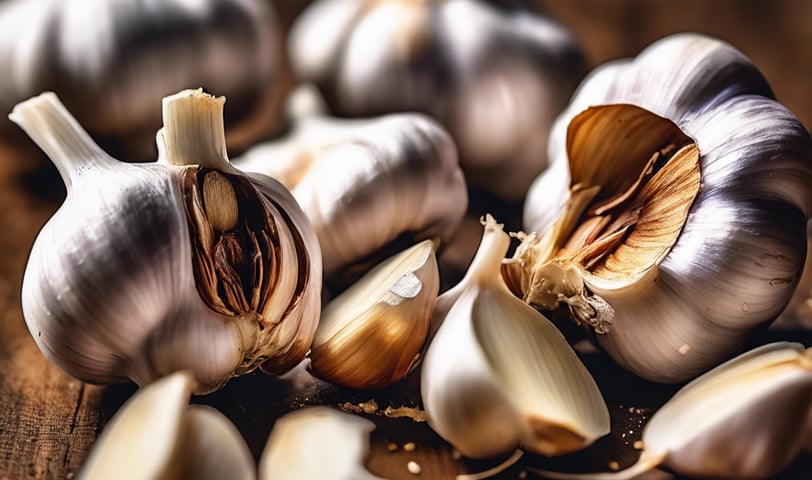The Incredible Benefits of Incorporating Garlic into Your Daily Life
LIFESTYLE TIPS
11/6/20243 min read


Nutritional Profile of Garlic: What Makes It so Beneficial?
Garlic (Allium sativum) is not only a flavorful addition to many cuisines but also a powerhouse of nutrition that provides numerous health benefits. The primary bioactive compound in garlic is allicin, which is formed when garlic is crushed or chopped. Allicin is known for its potent antimicrobial and anti-inflammatory properties, making it a significant contributor to overall health. Garlic is also rich in vitamins such as vitamin C, and vitamin B6, and essential minerals like manganese, calcium, and potassium. Together, these nutrients work synergistically to support various bodily functions.
One of the remarkable aspects of garlic is its high antioxidant content. Antioxidants help neutralize free radicals in the body, reducing oxidative stress and the risk of chronic diseases. A diet that includes garlic may also help enhance the immune system due to its ability to stimulate the production of white blood cells, which are essential for fighting infections.
Furthermore, garlic’s sulfur-containing compounds play a crucial role in cardiovascular health. They can help lower blood pressure and cholesterol levels, which are significant risk factors for heart disease. Research supports the incorporation of garlic into a diet for promoting heart health, with a suggested daily intake of about one to two cloves being optimal for maximizing health benefits.
For those following specific dietary plans, garlic is incredibly versatile. It can be easily added to Mediterranean, ketogenic, or vegan diets, providing flavor and essential nutrients. Whether consumed raw, roasted, or as a supplement, garlic is an exemplary dietary item that enhances the taste of meals and also significantly contributes to one's overall health.
6 Health Benefits of Garlic: From Boosting Immune Function to Heart Health
Regular consumption of garlic, primarily due to its active compound allicin, offers a range of proven health benefits:
Heart Health Support: Garlic has been shown to lower blood pressure, reduce LDL (bad) cholesterol, and help prevent atherosclerosis (hardening of the arteries), contributing to cardiovascular health. The sulfur compounds and antioxidants in garlic promote better blood circulation and protect against heart disease
Enhanced Immune System: Garlic's antimicrobial, antiviral, and antifungal properties strengthen the immune system, helping to guard against common illnesses like colds and respiratory infections. Studies indicate that garlic may reduce both the duration and frequency of colds.
Anti-inflammatory Properties: Garlic's active compounds, including allicin, have strong anti-inflammatory effects, which may benefit those with chronic inflammatory conditions. This reduction in inflammation supports joint health and may help alleviate pain from arthritis or muscle inflammation
Cancer Risk Reduction: Regular garlic intake has been linked to a decreased risk of certain cancers, notably stomach and colorectal cancers. Its sulfur compounds help detoxify, reduce oxidative stress, and inhibit abnormal cell growth, contributing to its potential cancer-preventive effects
Antioxidant Defense: Garlic is rich in antioxidants, which help combat cellular damage from free radicals. This antioxidant boost supports skin health, counters aging, and promotes overall cellular protection
Bone Health: Emerging evidence suggests that garlic may support bone density, particularly in women, by influencing estrogen levels. This effect may help reduce osteoporosis risk, especially in postmenopausal females.
Adding garlic in various forms—raw, cooked, or as a supplement—can support multiple areas of health. However, due to its potency, it’s recommended to consume garlic in moderate amounts to avoid potential digestive irritation.
Incorporating Garlic into Your Daily Routine: Tips and Recipes
Garlic, widely celebrated for its numerous health benefits, can easily be integrated into your daily meals. To maximize its flavor and therapeutic properties, consider these practical tips and delightful recipes.
First, it’s essential to choose fresh garlic bulbs. When selecting, opt for firm, unblemished heads with tight, dry skins. Store garlic in a cool, dark place, preferably in a breathable container, to maintain its flavor and efficacy. If you find yourself with too much garlic, consider peeling and freezing individual cloves in a dedicated container. This method preserves the garlic's health benefits and allows for quick access in your cooking process.
Adding garlic to dishes is simple and rewarding. Start your day with a savory breakfast by incorporating minced garlic into scrambled eggs. For lunch, a garlicky hummus makes an excellent dip for fresh vegetables or pita bread. To create this, blend canned chickpeas, tahini, olive oil, lemon juice, and roasted garlic. This recipe provides a nutritious and flavorful spread, easily enjoyed at any meal.
For dinner, explore the flavors of garlic-infused olive oil. Gently sauté minced garlic in olive oil and drizzle it over grilled vegetables or pasta. An exquisite garlic butter sauce can elevate grilled meats or seafood. Combine softened butter with minced garlic, fresh herbs, and a squeeze of lemon for a delectable dish that will impress any guest.
Lastly, don’t underestimate the potential of garlic in salad dressings. Combine olive oil, balsamic vinegar, crushed garlic, and a pinch of salt for a zesty dressing that transforms simple salads into something extraordinary. By incorporating these easy tips and recipes, garlic can become a staple ingredient in your daily diet, enhancing both flavor and health.
